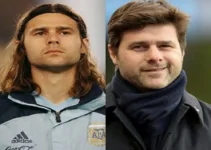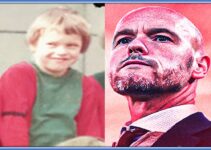This is the story of Ruben Amorim, who was once a boy who chased football dreams from the backseat of his father’s Ford Transit, dozing off as the rain hit the windows on long drives to training. Known today as “The Poet” for his sharp tactical mind, Amorim didn’t always dream of football glory—he first excelled in roller hockey, only stepping away from the sport after a clash with his coach. From that moment, football became his sole focus.
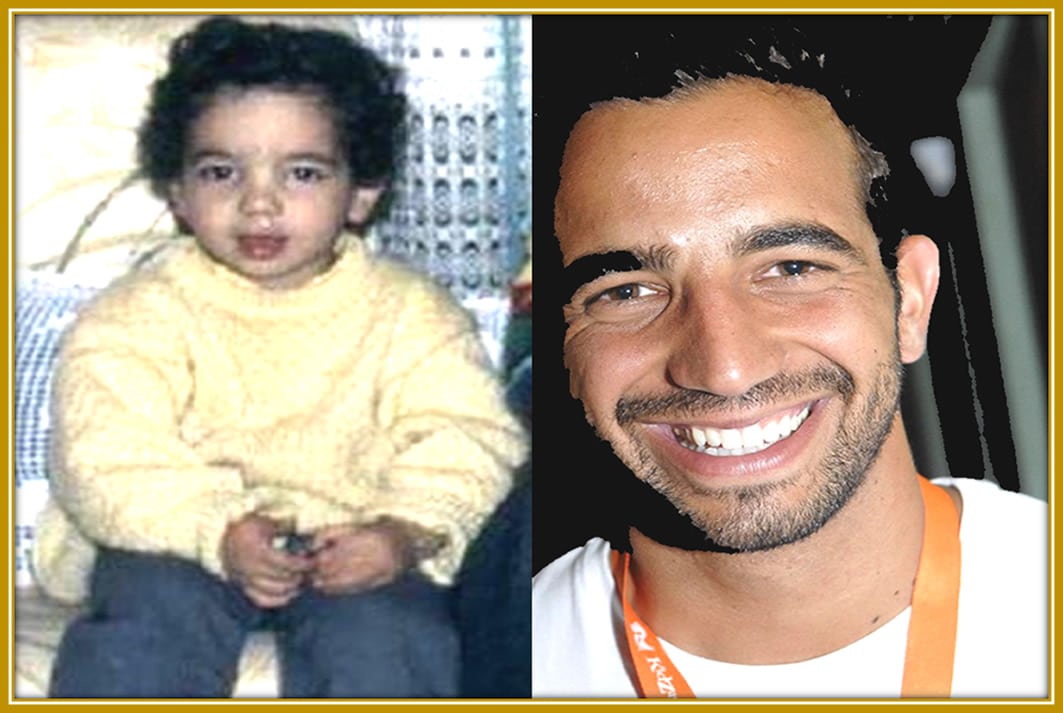
The Making of “The Poet”: Ruben Amorim’s Story of Resilience and Talent.
But Ruben’s path to success wasn’t without pains. At 13, his parents divorced, and he began splitting his time between his mother’s home in Corroios and his father’s in Alverca. This period marked a tough chapter in his life, marked by the strain of family separation and the challenge of building his football career. Amid these personal struggles, Ruben continued to pursue his passion for football despite the long distances, missed meals, and the heartbreak of being dismissed from Benfica, his beloved childhood club—a memory that left him in tears.
Overcoming these challenges, Rúben Amorim would go on to make his mark as a player and, later, as a manager, leading Sporting CP to win trophies. His journey, marked by resilience and determination, reflects the dedication of a boy who never lost his footing and never gave up, transforming his childhood heartbreak into strength and his dreams into a remarkable legacy.
Preamble:
Indeed, some things never change, and Ruben Amorim’s smile is one of them. From his humble beginnings as a boy with big dreams to his role managing Manchester United’s iconic Old Trafford—known as the Theatre of Dreams—that warm smile remains constant, reflecting the grounded and genuine spirit behind his incredible journey.
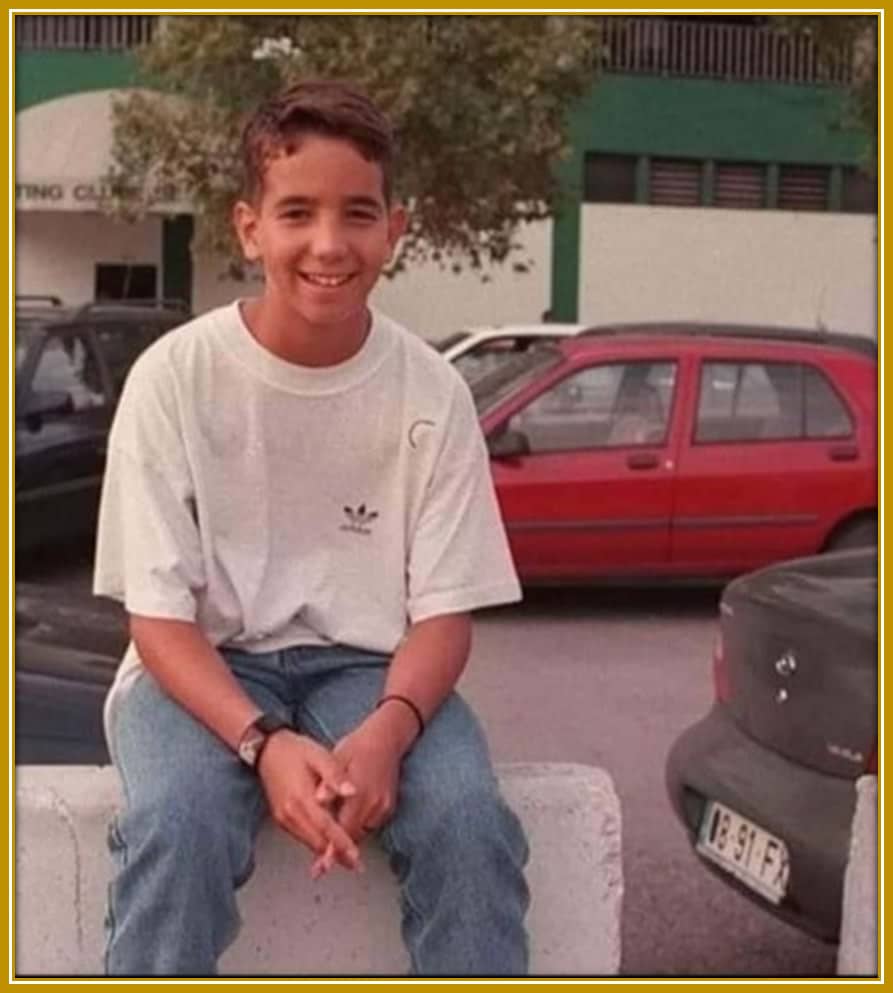
That signature smile shines through, capturing the warmth and humility that have stayed with him from his early days.
We’ll take a deep dive into the life of Ruben Amorim, exploring the path that shaped him beyond just tactics and coaching accolades. It tells the story of his upbringing, introducing the figures who influenced him most—his parents, Virgílio Amorim and Anabela Francisco, his siblings, Mauro and Cátia, and even his cousins, David and Bruno Simão. It also reveals the personal side of Rúben, including his relationship with Maria João Diogo, the woman who holds his heart.
This journey aims to take you through the full trajectory of Amorim’s life—from his early memories and family ties to the milestones that defined his path to fame. Through these pages, you’ll get a closer look at the man behind the manager, the childhood struggles he overcame, and the dreams he chased, bringing you closer to the inspiring figure he is today.
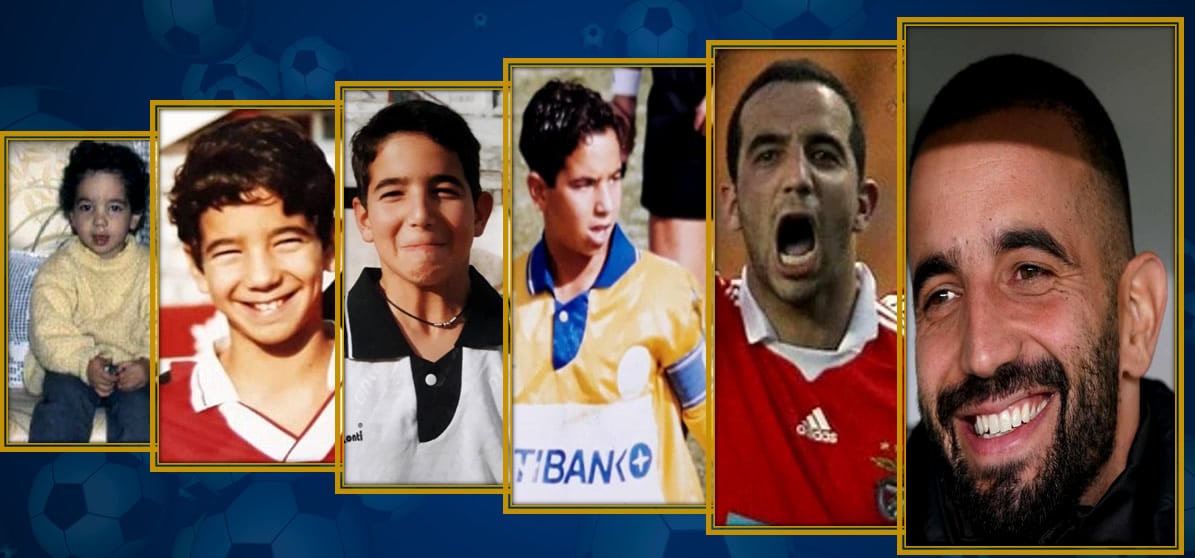
This collection captures the full journey of Rúben Amorim, showing moments from his early days to the major milestones that marked his rise in the world of football. Credit: Reuters, Maisfutebol
Childhood Story:
Rúben Filipe Marques Amorim, affectionately nicknamed “The Poet” by friend and former teammate Cristiano Ronaldo, has a story marked by resilience and ambition. Born on January 27, 1985, at the Alfredo da Costa Maternity Hospital in Lisbon, Portugal, he was welcomed as the second child of his parents, Virgílio Dalot Costa Amorim and Anabela Francisco.
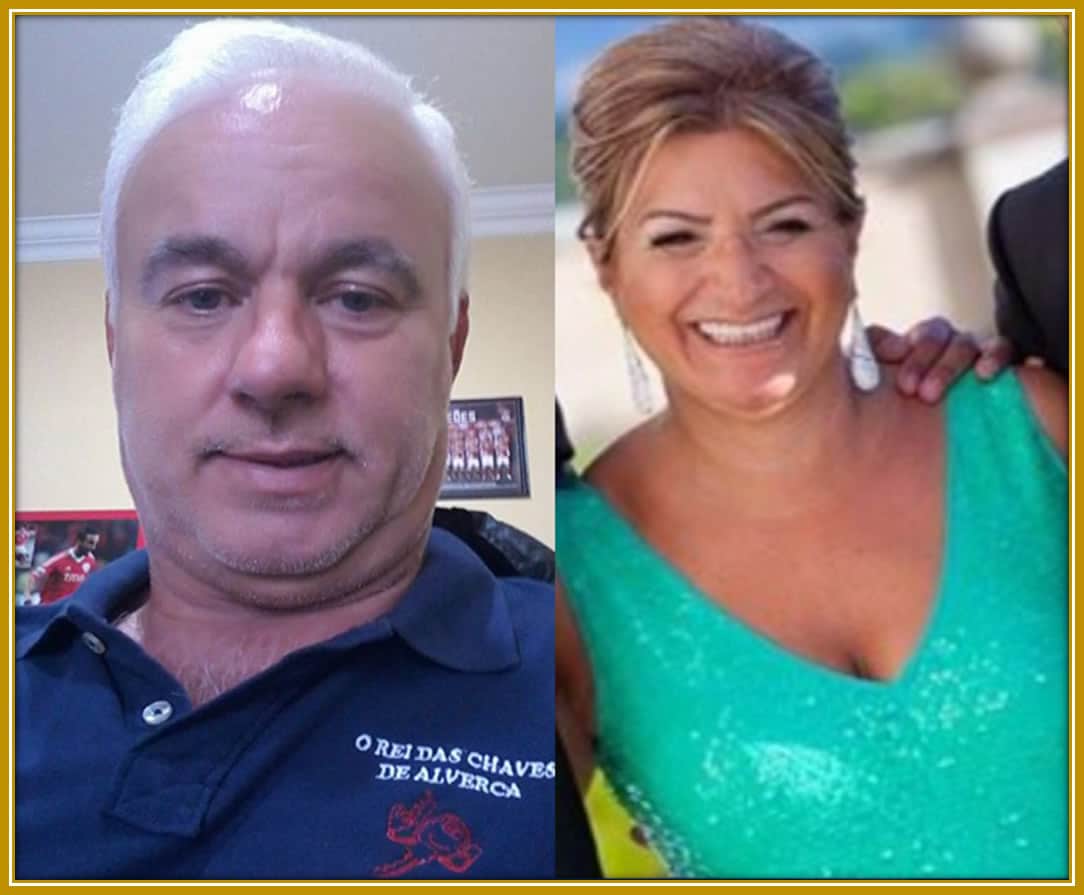
Meet Ruben Amorim’s parents – Virgílio Dalot Costa Amorim and Anabela Francisco. Credit: FlashPT, FaceBook/Reidaschaves.Alverca
Rúben Amorim’s mother, looking at his achievements as a manager with pride, recalls those early years and the challenges she endured nearly 40 years ago—memories that now bring a bittersweet smile. She shared that giving birth to Rúben was the most intense experience of her life, surpassing all the struggles of her youth. During her pregnancy, she was hospitalized for months, and Rúben came into the world earlier than expected. That challenging journey brought her a son who grew up to be not only a remarkable man but also a talented, driven leader on the football field.
Growing Up Years:
In the early years, the Amorim household was filled with energy and close family bonds. Growing up with his older brother, Mauro, who is just under two years his senior, Rúben experienced a childhood built on strong sibling ties and a warm family atmosphere. It wasn’t just about his immediate family; his extended family was also an essential part of his life. Among his closest family connections was his cousin Paulo, who practically grew up alongside him, and they formed a friendship as close as any siblings.
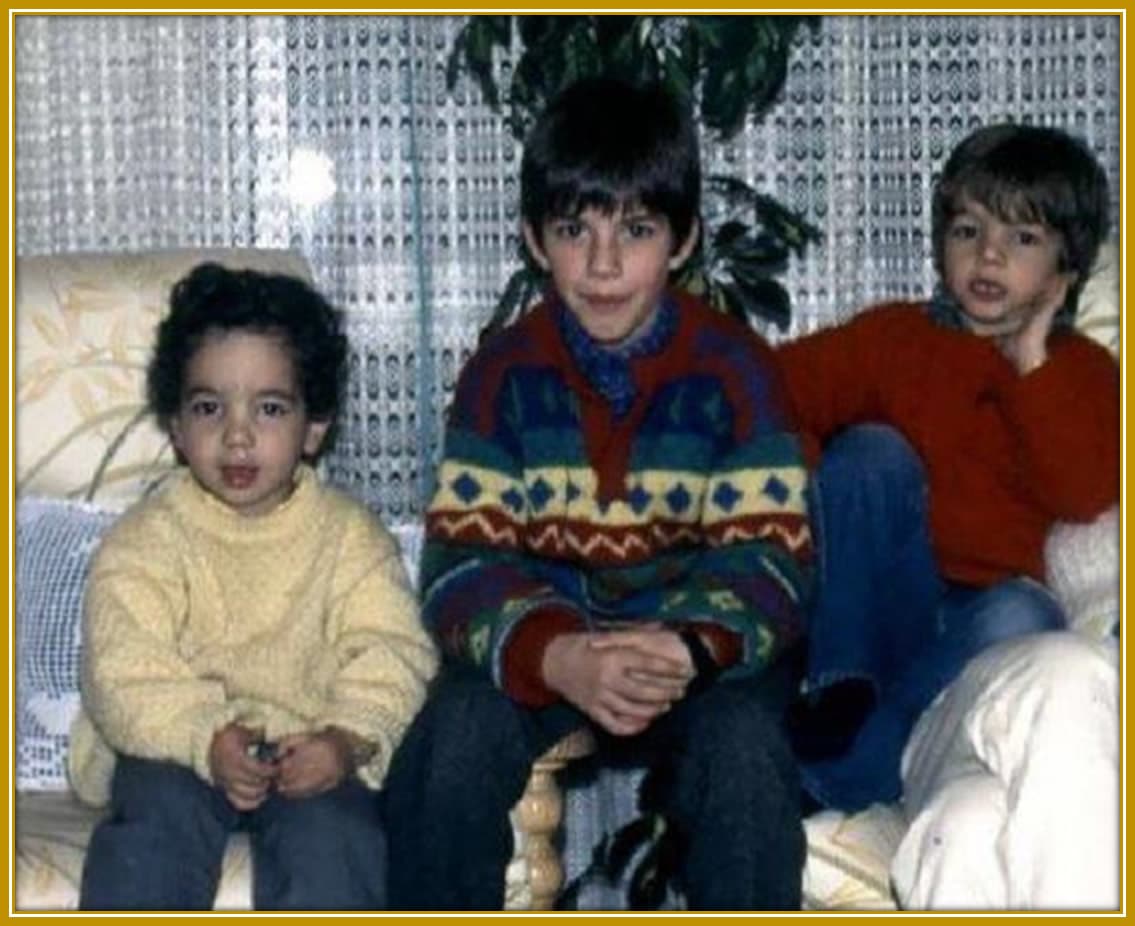
The three boys (Rúben on the left, Mauro in the middle, and cousin Paulo on the right), with their wide cute eyes. They were so full of innocence, and their togetherness symbolized the start of a close-knit family bond that would go on to shape Rúben’s life.
Rúben also shared special bonds with other cousins, including David Simão and Bruno Simão, who would later feature prominently in his life. Mauro, his older brother, and cousin Paulo, both a bit older than Rúben, were his constant companions in childhood adventures. Back then, the boys were practically inseparable, forming a tight-knit group that shaped much of Rúben’s early experiences and the family values that would guide him throughout his life.
No Friend Like Simão:
Among Rúben Amorim’s childhood friends, one name stands out: Bruno Simão. Not only are the two cousins, but they’ve also shared a strong friendship that has endured through the years. Their bond began in Benfica’s youth teams, and to this day, they consider each other as close as brothers. Rúben even serves as the godfather to Bruno’s son, and Bruno describes them as “brothers of different blood,” a testament to the deep connection they’ve maintained throughout their lives.
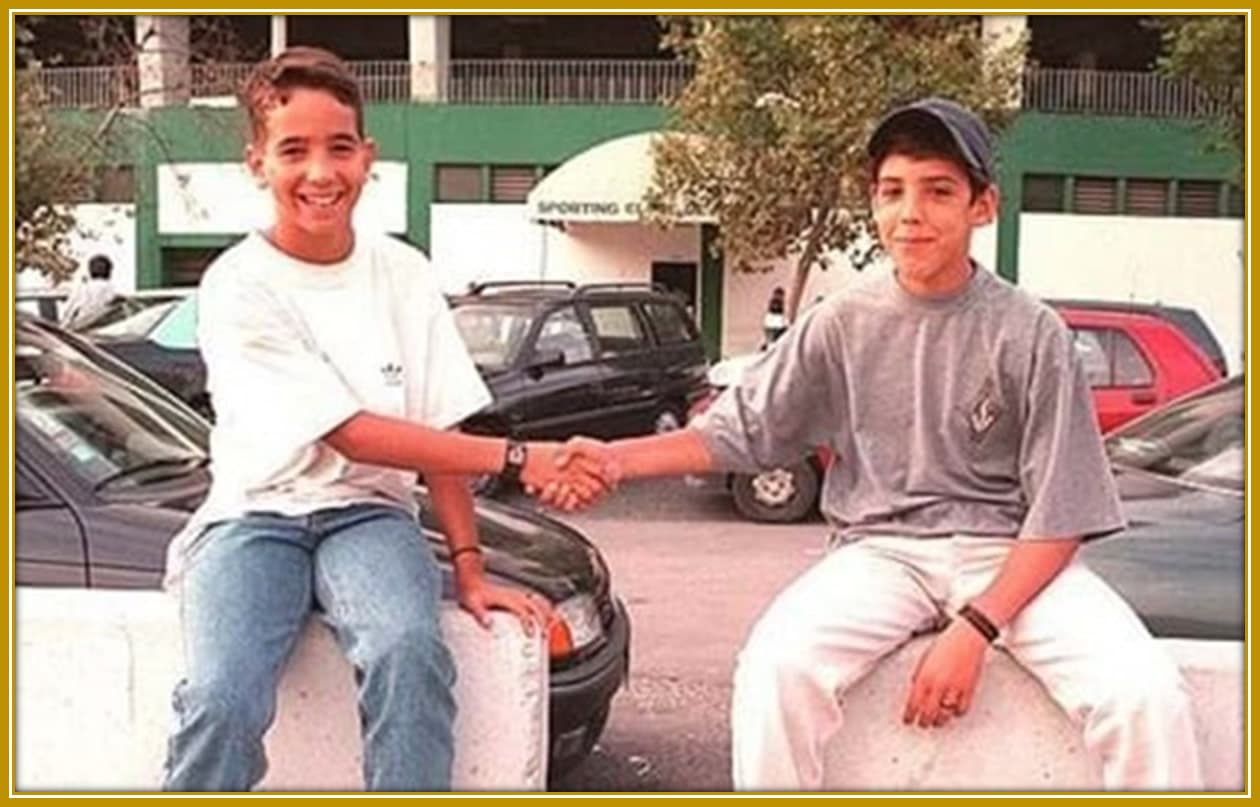
Their friendship began in childhood and has grown even closer over the years, with Rúben later becoming godfather to Bruno’s son.
Rúben and his brother Mauro had a lively, adventurous childhood, full of the ups and downs that come with growing up. As the younger sibling, Rúben often wanted things his way and wasn’t above using his “last-born privileges” to get it. Naturally, this led to some playful sibling rivalries, but despite their clashes, the two brothers shared a deep bond. They adored each other and enjoyed many of the same hobbies and leisure activities, making their brotherhood even closer.
Later in life, Rúben and Mauro gained a new family member—Cátia, their half-sister from their father’s side. Cátia, born from their father’s second relationship, brought a new dimension to the family, and although the siblings didn’t grow up together, they share the same father and a meaningful family connection. Cátia remains the youngest in the family, and it’s easy to see the special bond she shares with her big brothers, Rúben and Mauro. They show their sibling love openly, with a warm protectiveness that highlights their close-knit family ties.

Rúben, Mauro, and their youngest sibling Cátia, captured in a warm family moment. Credit: FlashPT
Early Life:
As soon as little Rúben let go of his pacifier, he started grabbing onto footballs—or anything that even looked like a round object. By the time he turned four, he and his older brother Mauro had become inseparable playmates, sharing a passion for the game. Football became their favourite way to pass the time, starting with casual games at home and eventually growing into a shared pastime at local indoor tournaments. These early matches were not only a joy for the boys but became popular events in the community, marking the start of Rúben’s journey in football.
People who knew Rúben Amorim as a child remember him as both funny and disciplined, a boy who could make anyone laugh yet always kept a steady head. Beyond his love for football, Rúben had a vibrant social side that few outside his early circle might know. He was even called the “king of the dance floor,” a title he lived up to whenever there was a party in his neighbourhood. While he enjoyed showing off his dance moves, what he loved even more was watching football matches. Known as a homebody, he often joked about being an “unadventurous boy,” happy to stay in and keep things simple, as long as football was part of the plan.
The Roller Hockey Story:
Rúben’s love for football kicked off at a very young age, filled with boundless energy and a noisy enthusiasm that made it clear he was destined for sports. His older brother Mauro, two years ahead of him, was already playing on a football team, but Rúben was still considered too young to join. Seeing his passion, Rúben’s parents, Virgílio and Anabela, came up with a creative solution: they enrolled him in roller hockey with FC Alverca, which had an age requirement perfect for him. This alternative kept him active and engaged while he waited to join Mauro on the football pitch.
Growing up, Rúben Amorim’s time at the Alverca roller hockey club was filled with fun and excitement as he met new teammates and made lasting friendships. At a young age, he was placed in goal, and he quickly discovered a natural affinity for the position. Rúben loved wearing the full goalie kit, which included the helmet, chest and arm protector, and lighter leg pads. He took to the role with such passion and skill that many began to think he might be destined for a career in roller hockey rather than football. Rúben’s dedication to roller hockey was clear, as he was known for his discipline and commitment to the sport.
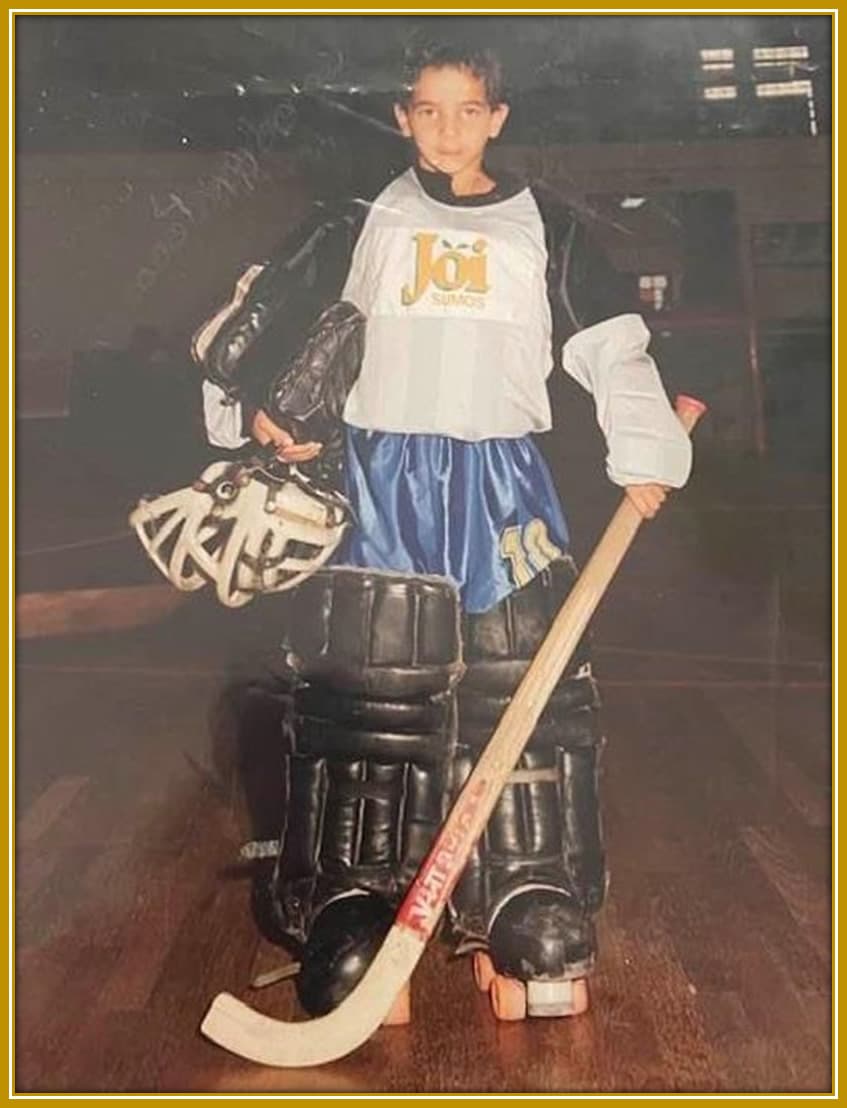
With every piece of gear, from helmet to leg pads, Rúben Amorim exudes the discipline that earned him recognition as a promising roller hockey talent before his shift to football.
Childhood Achievement with Hockey:
Amorim’s dedication to roller hockey was undeniable; he never missed a single training session. To this day, people who knew him back then still wonder why he made the switch to football. With such focus and passion for roller hockey, it’s a question that still lingers for many who remember his time as a promising goalie in the sport.
Did you know? Rúben Amorim’s talent on the roller hockey rink was undeniable. As a goalkeeper for FC Alverca, his skills helped prevent countless goals, and his contributions led the team to win their first international trophy. At the time, FC Alverca was the talk of the town, and Rúben was quickly making a name for himself. However, despite his promising career in roller hockey, his journey in the sport was about to come to an unexpected and abrupt end.
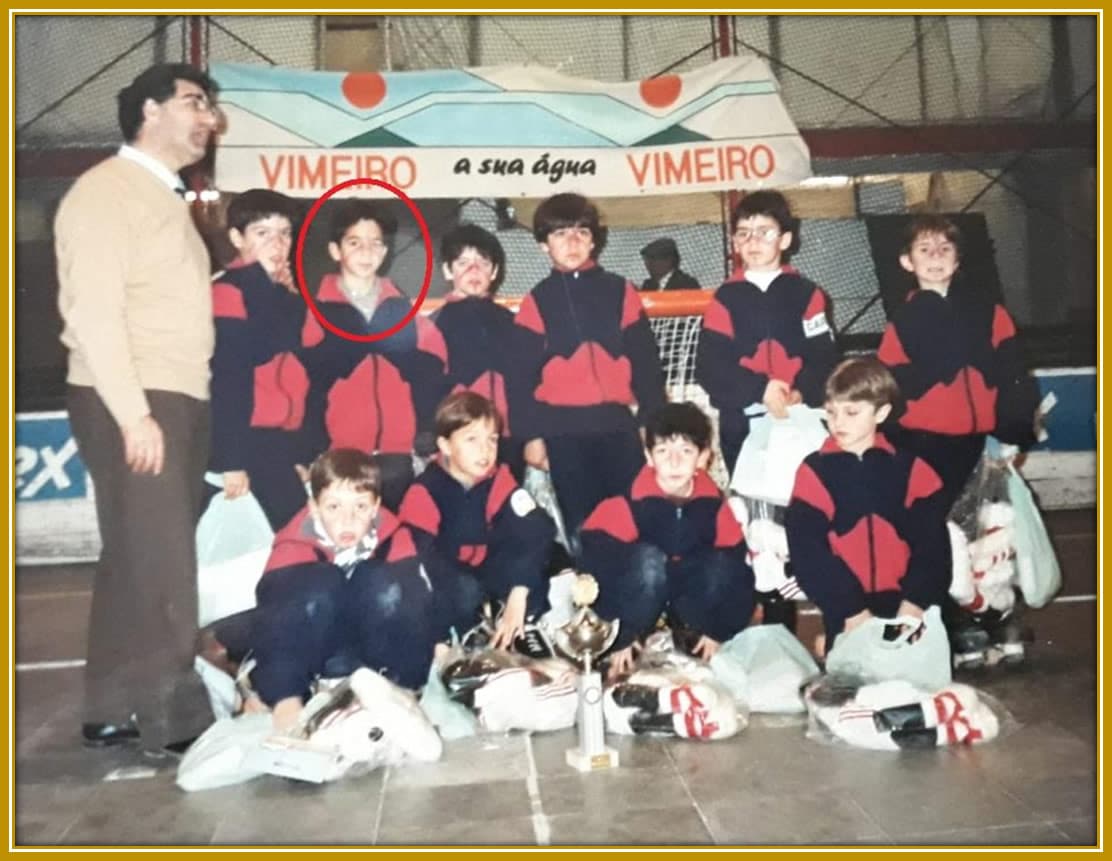
Young Rúben Amorim and his FC Alverca teammates pictured with their hard-earned honours at an international roller hockey tournament. This moment, though significant, would soon be followed by an unexpected turn in his roller hockey journey.
Why Rúben Amorim abandoned Roller Hockey:
Rúben’s decision to walk away from roller hockey came after an unexpected clash that began at home. On one particular day, the only time he was late for a game, Rúben’s strong-willed personality clashed with his father’s patience. Already frustrated, young Rúben arrived at the rink only to get into a spat with his coach. This coach’s remark, meant as a casual observation, struck a nerve with Rúben. He said something along the lines of,
“Rúben, didn’t sleep much last night, did you? Or maybe you were too busy playing to remember your hockey training?”
Those words lingered, sparking an anger in Rúben that marked the end of his roller hockey journey. Up until that point, the sport had been his passion and daily routine, but that one off-hand comment changed everything. After almost two years as a dedicated player, Rúben decided to leave roller hockey behind for good, setting him on the path toward his future in football.
Rúben was deeply upset by the clash, but being so young, he simply didn’t return to the rink. Not long after, Virgílio his dad began noticing that Rúben was asking for a pair of football boots instead of hockey gear. Nearly eight years old, Rúben’s interest in football became undeniable, and his dream of joining Benfica started to dominate his mind. Reflecting on the incident with the roller hockey coach, Virgílio shared in an interview,
“I say this with pride: My son Rúben was always a lovely, excellent child, but when he set his mind on something, there was no changing it. That’s why he left hockey—he was already very determined and upset with his coach. He’d even won an international hockey tournament in Vila Franca, but after that argument, he came to me and asked to start training at Benfica’s academy. He was almost eight years old.”
Family Background:
Rúben Amorim’s father, Virgílio Dalot Costa Amorim, has been a well-known business owner in Alverca, Lisbon, Portugal, for decades. Virgílio runs a local shop called O Rei das Chaves de Alverca (The King of Keys in Alverca), which specializes in key duplication services. Located at António Sérgio Street, 143 B, Store 12, the shop has been a fixture in the community since its founding in 1984.

Virgílio Amorim, a dedicated businessman and owner of O Rei das Chaves de Alverca, stands proudly in his store office. Image: Casa das chaves da Falagueira Comercial
In fact, O Rei das Chaves is celebrating a milestone—40 years of service to the community on October 15, 2024, an event for which Virgílio received congratulations from family and friends. As for Virgílio’s background, he studied at the Commercial and Industrial School of Vila Franca de Xira. Known for his commitment to his business, he has dedicated himself to serving the Alverca area with his trade skills, becoming a familiar figure in the local community.
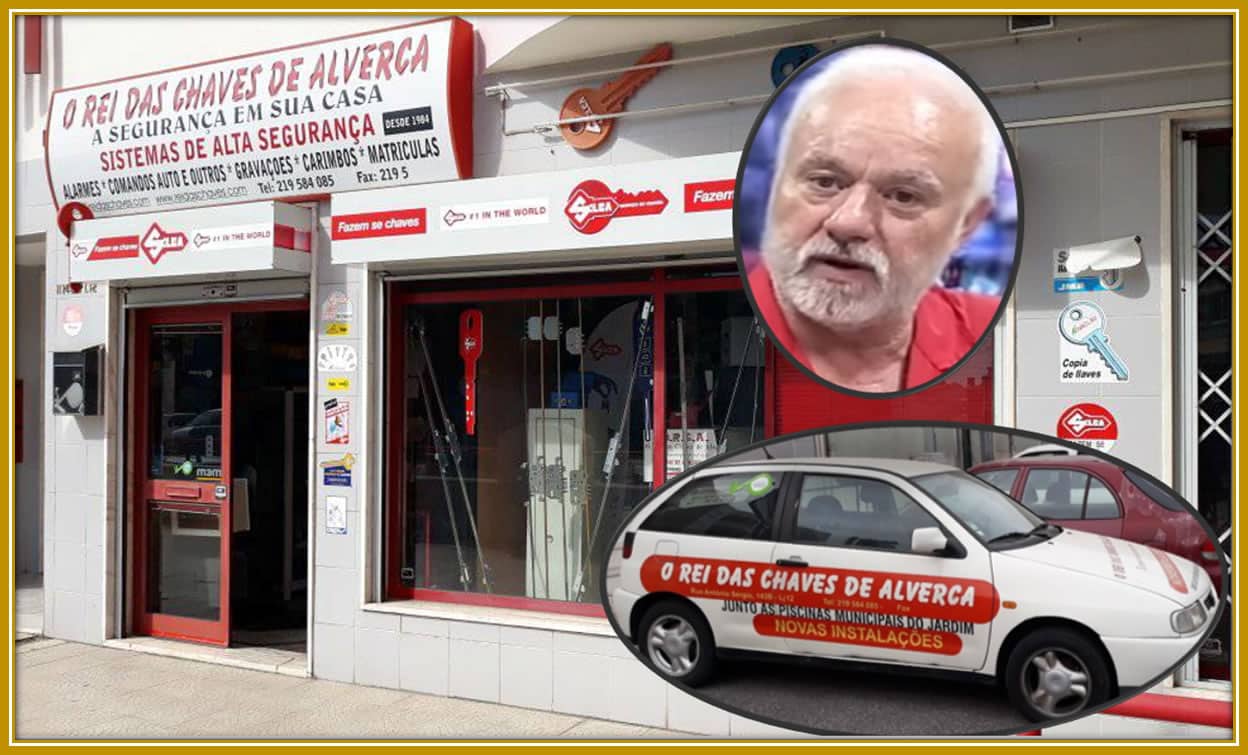
From the humble roots of his father’s key duplication business, a fine football mind, the person of Rúben Amorim, was nurtured.
Rúben Amorim’s Mum:
Anabela Francisco, an accountant by profession, is the kind of mother who places her family’s well-being above any kind of fame or recognition. While she takes quiet pride in seeing her son’s name in the headlines, her primary concern has always been his happiness and resilience. When Rúben was appointed to coach Sporting, her excitement was mixed with worry—especially considering his strong ties to Benfica. The thought of potential criticism and challenging scenarios naturally worried her. Through all of Rúben’s achievements, Anabela has stayed grounded, unfazed by the spotlight or the financial success her son has achieved in Manchester.
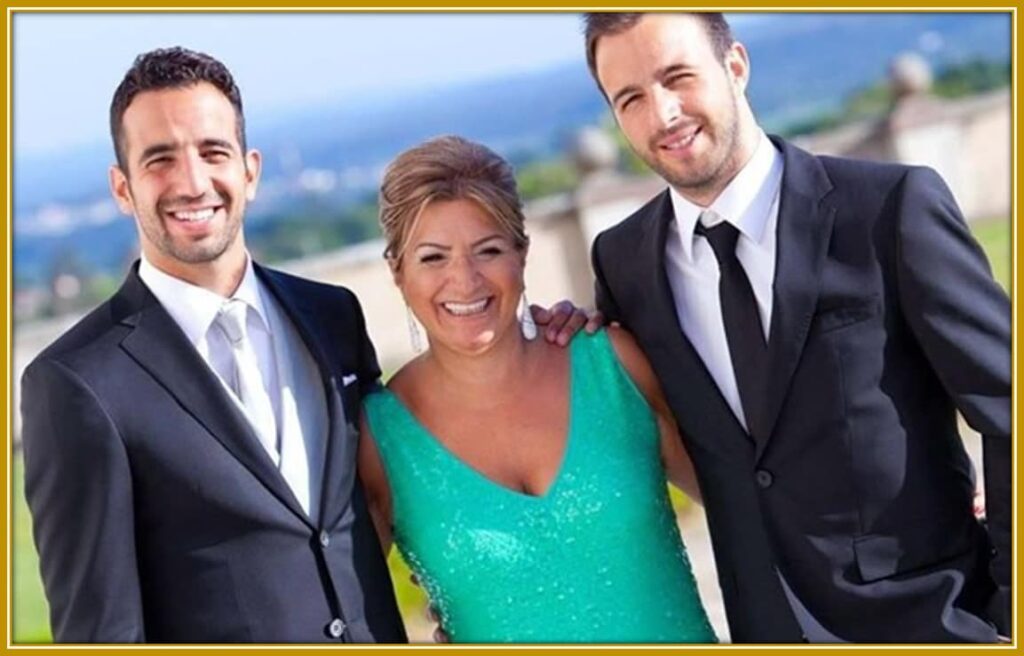
Anabela Francisco with her two sons, Rúben and Mauro, a moment of family love.
Ruben Amorim Family Origin:
Amorim, born and raised in Portugal, once proudly represented the Portuguese national team, reflecting his strong ties to the country. However, a closer look into his heritage uncovers family roots in Brazil. His father, Virgílio Dalot Costa Amorim, traces his ancestry to Alhandra, in the state of Paraíba, Brazil. This region has also produced notable football talent, including players like Otávio and Matheus Cunha, who share a connection to Paraíba, making Rúben’s background a blend of Portuguese identity with Brazilian lineage.

Young Rúben Amorim and his father, Virgílio, highlighting their family roots in Paraíba, Brazil.
Education:
From as young as three, Rúben Amorim began his education at the Cebi Foundation, where he studied through to the fourth grade. By age ten, his father, Virgílio, agreed for Rúben and his older brother Mauro to move with their mother to Charneca da Caparica, near Corroios. This marked a big transition, as Rúben had to adjust to a new environment after his parents’ separation. Having grown up in a quiet school setting, he found it challenging to settle into his new school, where he later recalled experiencing theft incidents that made the change even harder.
Ruben Amorim Biography: Football Story:
With the unwavering support and sacrifices of his parents, Rúben Amorim opened the first chapter of what would become a remarkable journey in football. His path to greatness started with futsal, a game that demanded teamwork and skill. In this close-knit environment, Rúben learned the value of contributing to a team—assisting, setting up plays, and scoring goals. His talent shone in a futsal team that dominated local tournaments, sweeping titles across Ribatejo. One of his most cherished memories from this period was winning the district championship of AF Setúbal with Ginásio de Corroios, a victory that fueled his drive for a future in the sport.
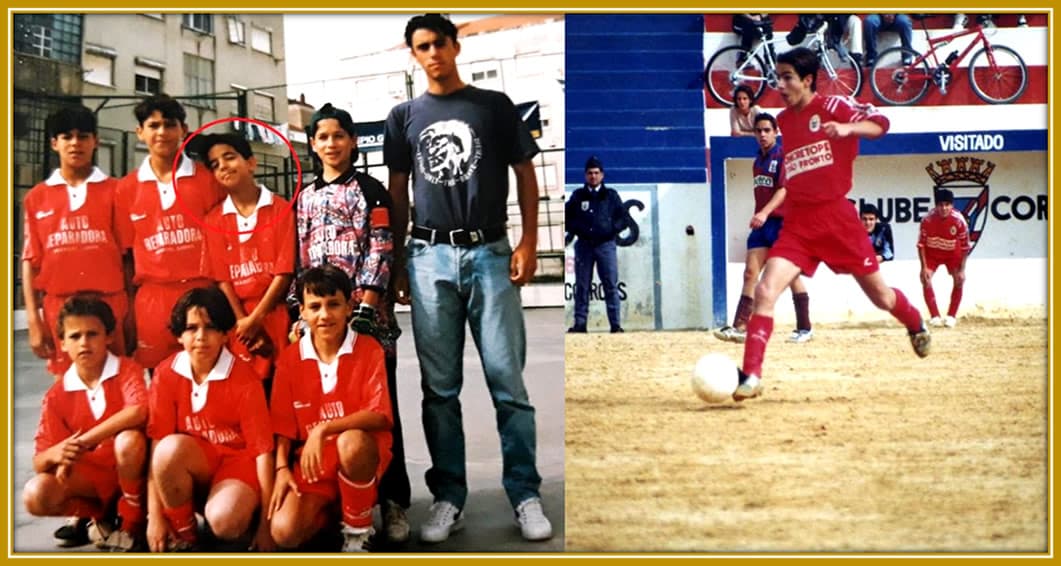
He was so full of energy and drive, skillfully manoeuvring the ball on his futsal team, showing the early sparks of the talent that would lead him to football greatness.
Joining the Academy of his Childhood Dream club:
After leaving roller hockey, he dreamed of taking a path that would lead him to join the academy of his dreams. Thankfully, that happened as Rúben Amorim joined the youth team of his dream club, Benfica. His first coach, Professor Rui Oliveira, along with assistant coach António Bastos Lopes, quickly saw Rúben’s potential and developed a close bond with him. The coaches were already friends with Rúben’s father, Virgílio, through his older brother Mauro, who also played for the club. Recognizing young Rúben’s talent, the coaches urged Virgílio to make sure he never missed a training session, convinced they had a budding genius on their hands.
Another key mentor was Fernando Chalana, a celebrated football talent of his era who sadly passed away in 2022. Chalana treated Rúben like family, guiding him with a fatherly touch that left a lasting impact on the young player’s career.
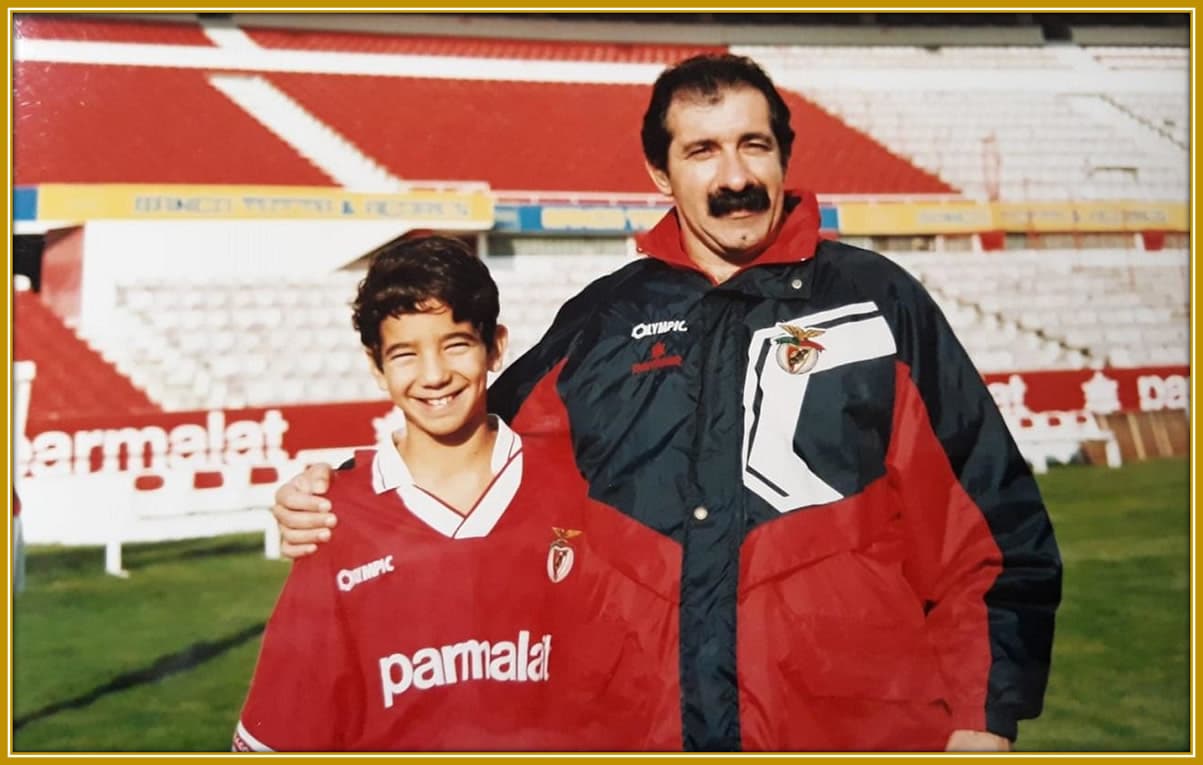
A young Rúben Amorim stands proudly next to his mentor, Fernando Chalana, a figure who guided him with both football wisdom and fatherly care in his early Benfica days.
Meeting his Best Friends:
During the 1993/94 season, young Rúben began building friendships that would last a lifetime. Among these was João Pereira, a fellow footballer who quickly became one of his closest friends. Years later, their paths crossed again when Rúben coached João at Sporting CP, where João played until his retirement at 37. This friendship endures to this day, resembling the bond Rúben shares with his cousin, Bruno Simão, whom he affectionately calls his “brother from another mother.” At age 12, Rúben was already showcasing his talent as part of the AF Lisboa national team, marking his early years with strong connections and budding success.
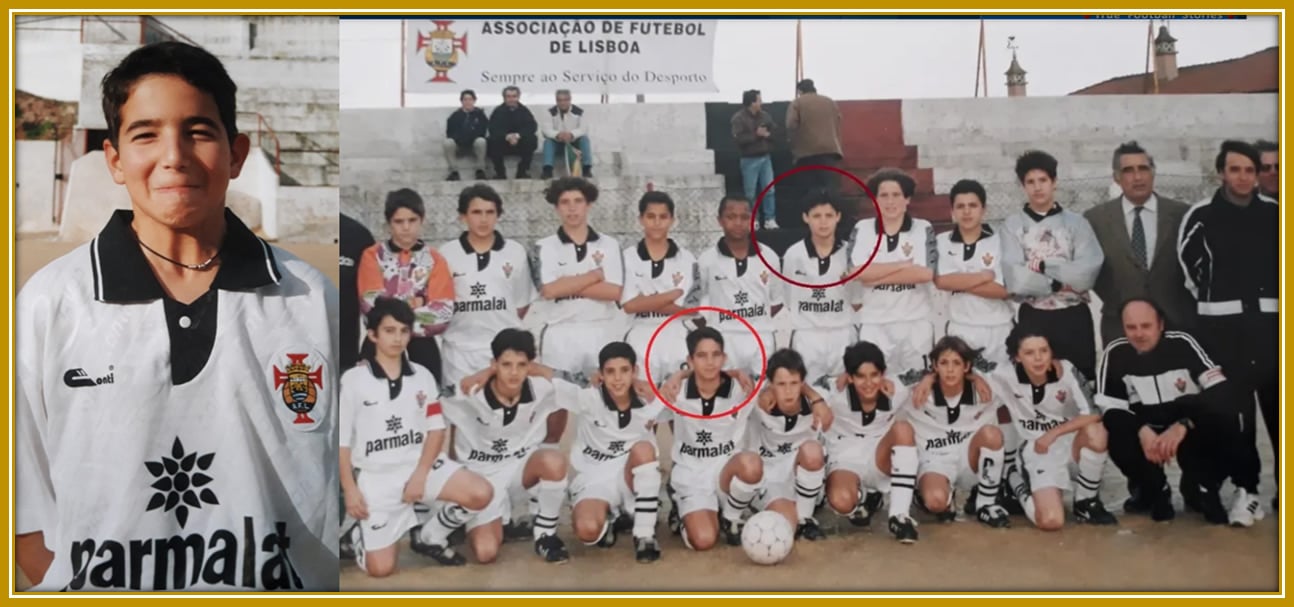
João Pereira and Rúben Amorim (circled in red) share a connection that began in childhood and has lasted through their careers, first as teammates and later as player and coach at Sporting CP. Image Credit: Maisfutebol.
Rúben Amorim’s playing style was thoughtful and grounded, marked by a simplicity and intelligence that made him a standout. He approached the game with honesty and confidence, and his personality shone through in every play. Surrounded by talented teammates, he knew he had to work harder to make his mark—a challenge he took on with determination. Known for his focus during training, it was during this period that he started to show his versatility. Originally a central midfielder, he sometimes found himself asked to play on the left. Though this change initially frustrated him, he quickly adapted, excelling in the new role with an impressive understanding of the game no matter where he played.
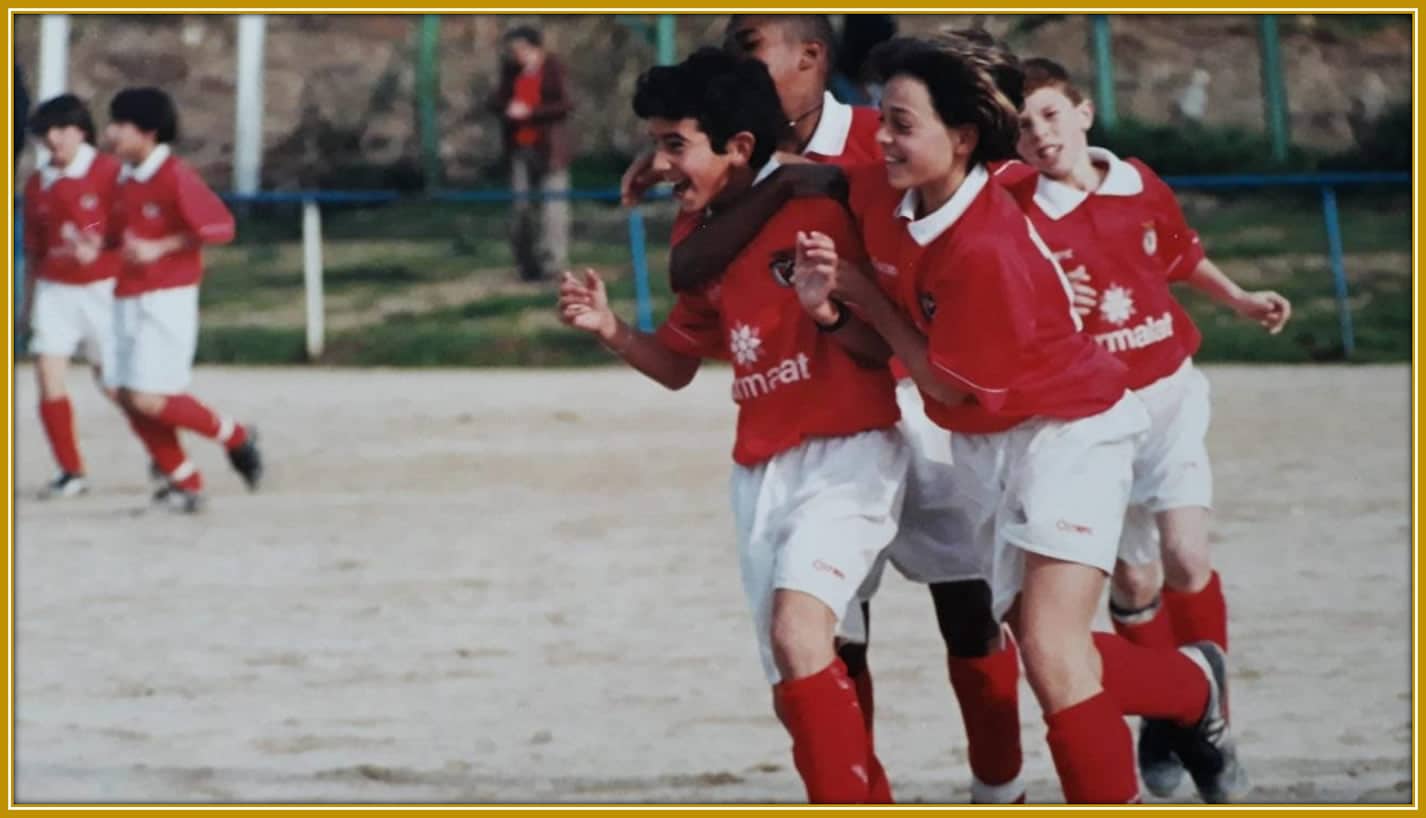
He celebrates with pure joy after scoring, capturing a moment that reflects his passion and hard work on the pitch.
A proud moment of his Childhood:
One of the proudest moments in Rúben Amorim’s early career came when he captained Benfica in a heated derby against their fiercest rivals, Sporting CP. He proudly led Benfica as captain in the derby against the very team that would one day define his managerial career journey. Even as a young leader, Rúben had a way of connecting with his teammates, both on the field and in the dressing room, always exchanging ideas and communicating clearly. His leadership style was marked by confidence and clarity. Ironically, though, destiny would later lead him to his greatest career success with the very club he once saw as a rival: Sporting CP.
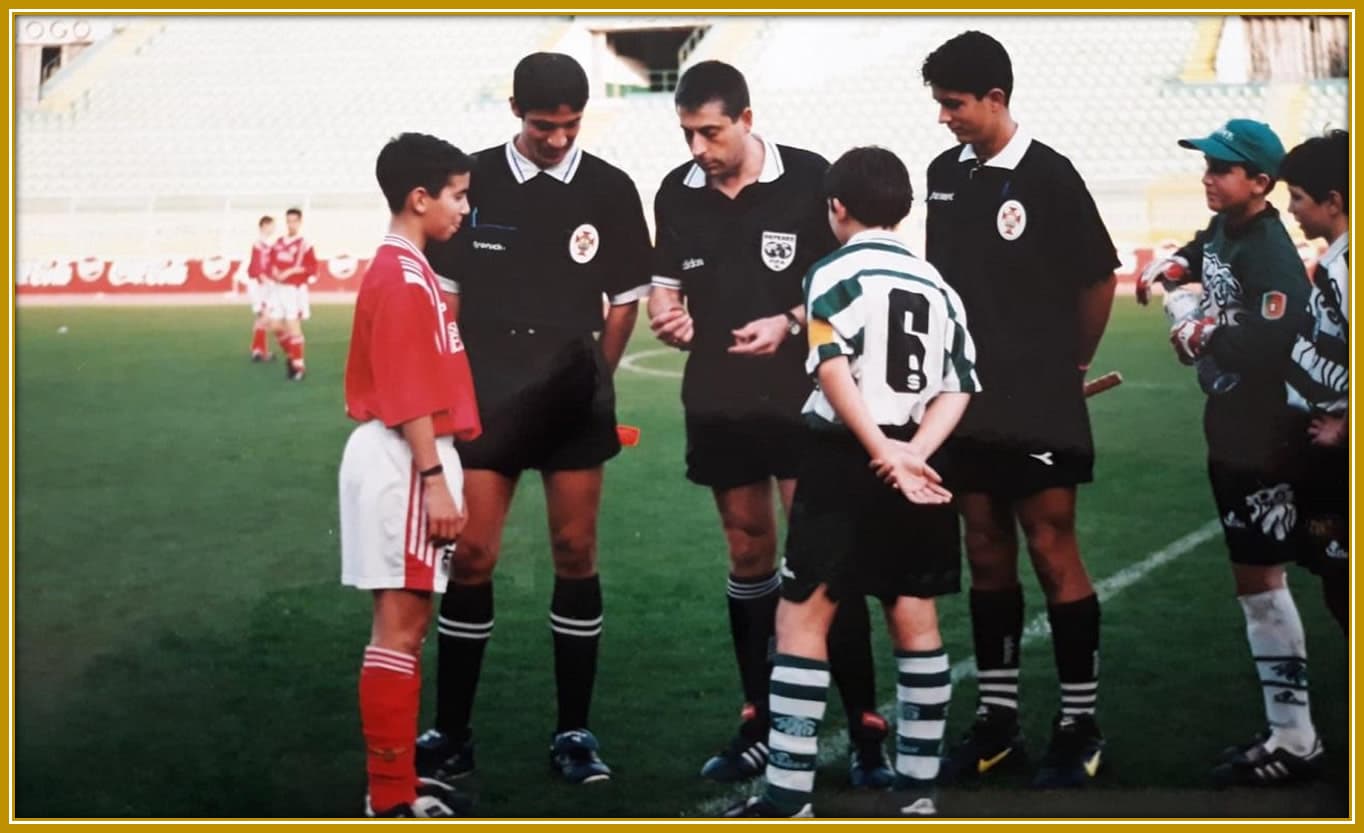
On this day, he faced off against Sporting CP—the club where he’d later rise to even greater heights.
When the Going Got Tough:
In October 1997, a pivotal moment unfolded for Benfica when João Vale e Azevedo took the reins as the club’s 34th president, winning the election against Abílio Rodrigues and Luís Tadeu. Vale e Azevedo’s leadership brought immediate and drastic changes that created uncertainty for both players and staff. Only 13 years old at the time, Rúben Amorim was caught up in these sweeping transformations, receiving the first significant setback of his young career. Under Vale e Azevedo’s directive, Benfica’s B teams were disbanded, leading to the release of dozens of players, including many young academy talents like Rúben.
For Rúben, this was a painful experience, one he wouldn’t forget. Reflecting on this difficult chapter, Virgílio Amorim, Rúben’s father, once shared:
“That man destroyed five years of Benfica’s youth development. Rúben cried his heart out; all the kids did.”
During this challenging time, Rúben Amorim was already facing major changes at home, with his parents separating—a shift that meant moving with his mother, Anabela, and brother Mauro to Charneca da Caparica, close to Corroios in Almada. This new neighbourhood, on the south bank of the Tagus, came with its own challenges and a different environment, one that was less sheltered than the quiet schools he was used to. In Corroios, young Rúben had to adjust to a new reality, one that wasn’t always safe; he even recalls being robbed there a couple of times.
These were difficult days, not only because of family changes but also due to his unexpected release from Benfica, the club he dreamed of. Balancing these struggles was not easy for young Rúben, and they became defining moments that he carried forward as he began the next chapter of his journey.
Journey to Fame:
After Rúben’s unexpected release from Benfica, several of his close friends joined him at CAC da Pontinha, creating a solid, tight-knit team. Ironically, Sporting CP quickly reached out, hearing that these promising young talents were suddenly available. But despite the opportunity, Rúben, a devoted Benfica fan, had little interest in wearing the jersey of his boyhood club’s rival. Fast forward 24 years, and fate led him back to Sporting—this time as a coach, bringing renewed hope to its fans. Before that chapter began in 2021, Rúben spent a transformative period at Belenenses, which he joined at 17, stepping into the next stage of his journey.
At that young age, Rúben felt he’d made one of his best choices as a footballer by joining Belenenses. His cousin Bruno Simão, also a player at the club, had encouraged him to take it on as a fresh challenge. Even with a fractured arm, Rúben went out to train with the youth team, showing his resilience. Reflecting on that time, Bruno recalls:
“I was already at Belenenses and had told the coach about Rúben. Despite his injury, he came to train, and the coach placed him in central defense to protect him from direct play. By the end of practice, the coach came up to me and said, ‘Thank you, Bruno! You were right, we’ve got a star here!'”
This marked the beginning of Rúben’s six-year journey with Belenenses, a time that would prove transformative for his career and ultimately lead him to new heights in football.

Rúben’s journey with Belenenses began with an act of resilience.
From the moment he joined Belenenses, his career as a footballer became very rich. He would go on to spend five seasons as a professional in the Belenenses senior team before forgiving his old club, Benfica, who begged to have him back. With his beloved Benfica, Ruben earned a Portuguese national team call, where he played alongside notable names like William Carvalho, the veteran Pepe and the great Cristiano Ronaldo.
Road to Managerial Fame:
Shortly after retiring, Amorim enrolled with the Lisbon Football Association in his pursuit of a coaching licence. At this time of his life, he was in search of a mentor, someone who would groom him into becoming a great coach. Did you know?… Amorim applied for an internship under the former Manchester United manager José Mourinho, and the internship was approved. He joined the long list of names whom Jose Mourinho has mentored in the past into becoming a successful manager. We talk about names like Brendan Rodgers, André Villas-Boas and Steve Clarke.
Amorim officially began coaching at Casa Pia, a third-division team, in 2018. It didn’t start as he had planned, and after losing his first two games and, with his pride hurt and doubts setting in, Ruben announced if he lost the third game, he would quit. Thankfully, that didn’t happen as the Portuguese Boss hit instant success and found a new coaching system that worked. His team, Casa Pia, embarked on an unbeaten run, and they were truly unstoppable. He also felt he had found the formation that allowed him to produce the football he wanted.
Trials and Temptation:
In January 2019, Ruben Amorim hit a major setback. His team, Casa Pia, was docked six points, and he faced a one-year suspension for allegedly breaking coaching rules. The issue? Apparently, he’d been giving instructions during a match without holding the necessary coaching license. Amorim fought back, appealing the suspension, and eventually, it was lifted. Yet, even with the ban removed, he decided it was time to step away and handed in his resignation.
Just a year and a few months into coaching, Ruben Amorim was already setting his sights high—dreaming of one day coaching Benfica’s first team. After resigning from Casa Pia, he was offered a job as Benfica’s under-23 coach, which seemed like a solid stepping stone. But when the time came to finalize it, Amorim turned it down, sensing that he was ready for a lead role, not just a minor one. Ironically, though, he soon found himself coaching Braga’s reserve team in the third tier, exactly the kind of role he’d been hoping to avoid. Instead of waiting around for a top-tier opportunity, he embraced the challenge right where he was.
The Bold Move:
By mid-September 2019, Ruben Amorim was working wonders with Braga’s reserve team in the third tier, winning an impressive seven out of eight games. His success didn’t go unnoticed—three months later, he was promoted to head coach of the senior team after Ricardo Sá Pinto’s dismissal. Amorim’s touch didn’t just lift morale; it led to historic moments. Under his guidance, Braga, with players like Francisco Trincao and Abel Ruiz, achieved their first away victory over Benfica in 65 years, thanks to a goal from João Palhinha. He went on to secure a remarkable ten wins in just 13 games, pushing Braga up to third in the league with only two losses, making it clear that Amorim was something special.
Sporting CP and Beyond:
Ruben Amorim’s impressive run with Braga didn’t go unnoticed by Sporting CP. Though he had only two months of top-flight coaching experience, Sporting made an unprecedented move, paying €10 million to secure him—making it the third-highest transfer fee ever for a manager. Amorim walked into a club still haunted by the chaos of 2018, when about 50 fans stormed Sporting’s training grounds, violently targeting players and staff, including Bruno Fernandes and Gonzalo Plata. But Amorim managed to restore calm and stability, easing tensions and guiding the club forward from those dark days.
To win over the fans and elevate Sporting’s status, Ruben Amorim delivered the club’s first league title in 19 years. He made strategic moves, securing Pedro Gonçalves from Famalicão and giving debuts to young talents like Gonçalo Inácio (CB), Matheus Nunes, and Nuno Mendes. In 2023, Sporting set a club record by signing Coventry City striker Viktor Gyökeres for €20 million, signalling their ambition. After claiming a second league title and continuing his remarkable rise, Amorim caught the attention of Manchester United, who triggered his €10 million release clause to potentially succeed Erik ten Hag. His transfer to the Red Devils was followed by huge speculation on Ruud van Nistelrooy’s future. In the end, the Dutch Football Legend left the club. From a young roller hockey player to a manager at the Theatre of Dreams, Amorim’s journey has truly become the stuff of legend.
Love Life:
Behind the rise of Portugal’s managerial prodigy Ruben Amorim is the remarkable Maria João Diogo—a woman known for both her beauty and intellect. Maria isn’t just a supportive partner; she’s a successful businesswoman with a speciality in interior design and holds an academic degree in telecommunications engineering. Her blend of creativity and technical expertise complements Ruben’s ambitions, making them a true power couple.
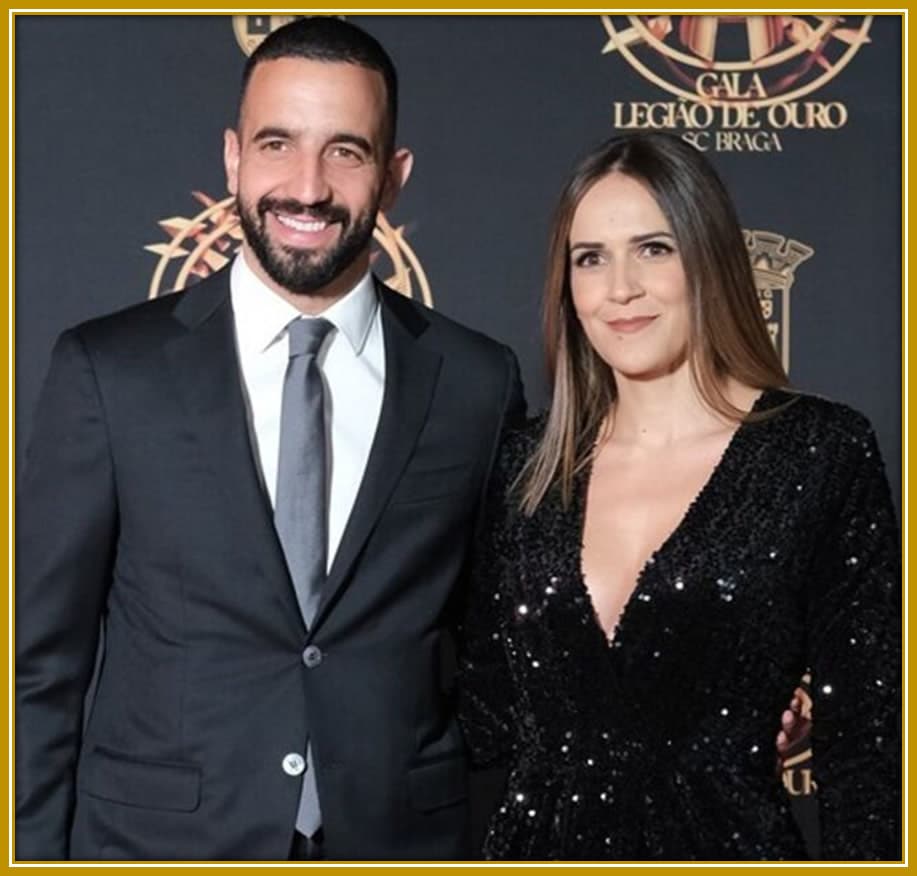
Two love birds… captured in a moment of elegance. Image: CMJornal
It turns out Maria João Diogo, Ruben Amorim’s wife, has strong ties to the football world through her family. Did you know? She is the sister-in-law of Antero Henrique, the former Sporting director at PSG, who played a key role in the record-breaking €222 million transfer of Neymar to the French club in 2017.
Knowing more about the couple:
Maria João Diogo and Ruben Amorim love stepping out together, especially for football events. While Ruben is more of a homebody, Maria brings out his best in the public eye, adding a touch of balance to his otherwise reserved nature. Together, they make a standout pair, blending his passion for football with her lively spirit.

Ruben and Maria, a perfect match—blending passion and poise at every event. Credit: tv7dias.pt
Additionally, Maria João’s sister, Inês, is married to Luís Filipe, a former player for Braga, Sporting CP, and Benfica. It’s clear just how well-connected she is within the football world. Here, we see Ruben Amorim and his wife, Maria João, on their special wedding day.
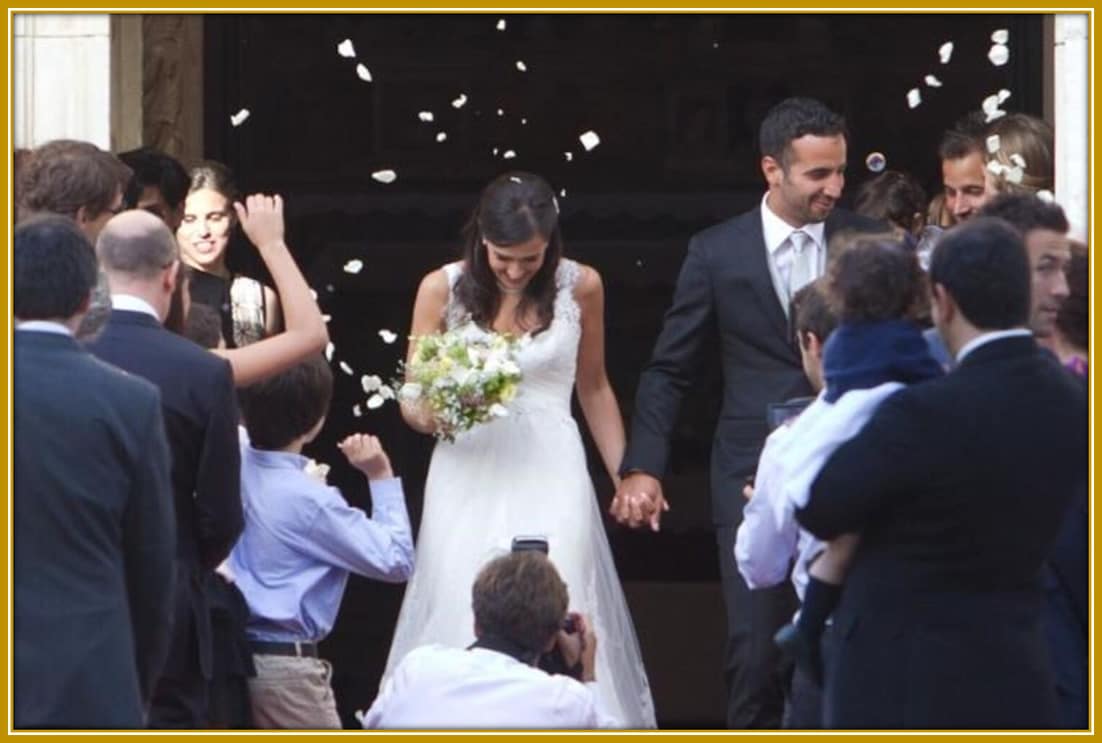
Ruben Amorim and Maria João Diogo, celebrating their love on their wedding day—a beautiful union of passion, success, and shared dreams. Image Credit: CMJornal
Maria and Ruben’s wedding was held at the stunning Palácio e Mosteiro de São Marcos (Saint Mark Palace and Monastery) in Coimbra. Since tying the knot on June 23, 2016, the couple has had even more reasons to celebrate, as they are proud parents to two children. Their son, Miguel Amorim, was born in 2016, the same year Ruben retired from professional football after his time playing for Al-Wakrah SC.

Amorim and Maria João Diogo, embracing the joy of parenthood as they eagerly await the arrival of their little one.
Personality:
Though he’s now a busy coach leading the charge at the iconic Theatre of Dreams, Ruben Amorim’s down-to-earth personality has roots that go back to his early days. His cousin, Bruno Simão, paints a clear picture of who Ruben was—a true homebody, deeply invested in the game. While Bruno would be outside playing, Ruben was content to stay in, glued to the TV, watching matches, or playing FIFA Manager on the PlayStation. Football was always central to his life, shaping his mindset even back then.
Over time, his quiet focus evolved, driving his ambition to lead teams and become one of the best coaches in the world. Despite his intense passion for the sport, Ruben has always kept a level head, balancing his personal goals with humility. In Bruno’s words, Ruben is a family man, a driven leader, and someone who aspires for greatness without losing his grounded nature.
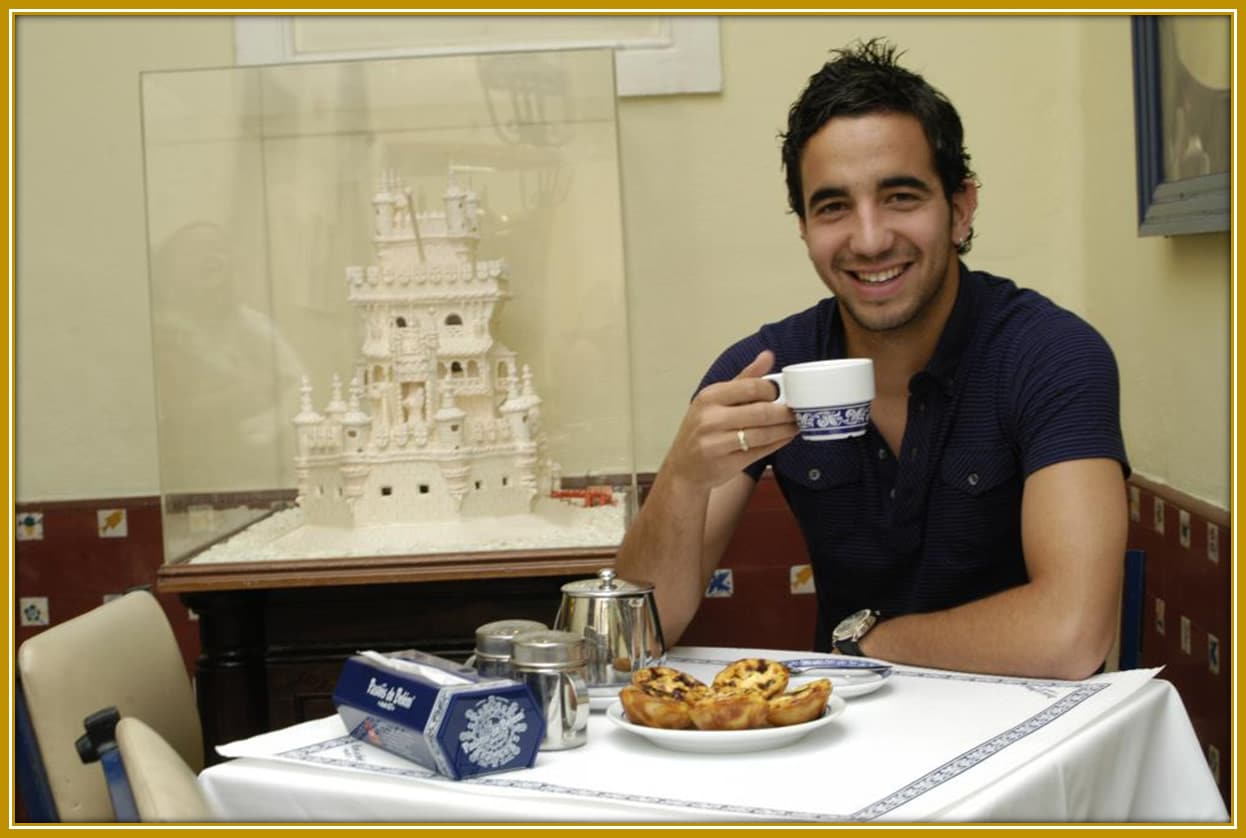
Amorim, the humble football mastermind, enjoying a quiet moment with a warm cup of tea—calm, grounded, and driven by the passion that’s guided him from his early days. Credit: TV7Dias
Appreciation Note:
Thank you for taking the time to read Ruben Amorim’s untold story. Our team is dedicated to bringing you accurate, fair, and engaging stories about soccer figures, including names like Arne Slot and Enzo Maresca. Stories of rising talents like Patrick Dorgu and Toby Collyer, both linked to Manchester United, are captivating for any football enthusiast. Their journeys are worth watching closely. If you notice anything in this piece on Ruben that seems off, please let us know in the comments. We’d also love to hear your thoughts on the Poet—share your insights with us.
